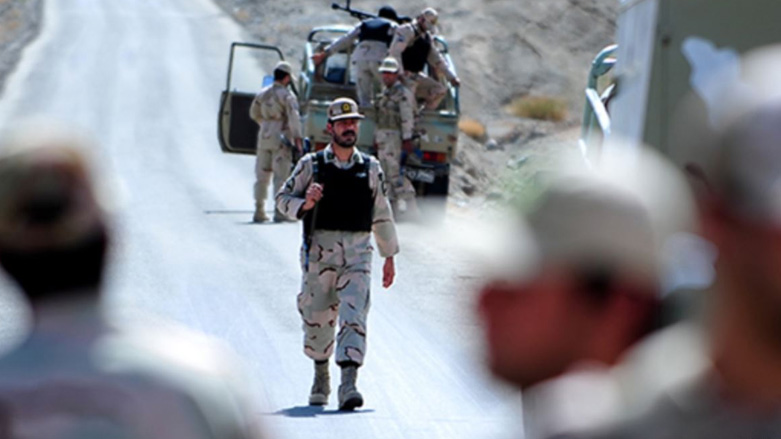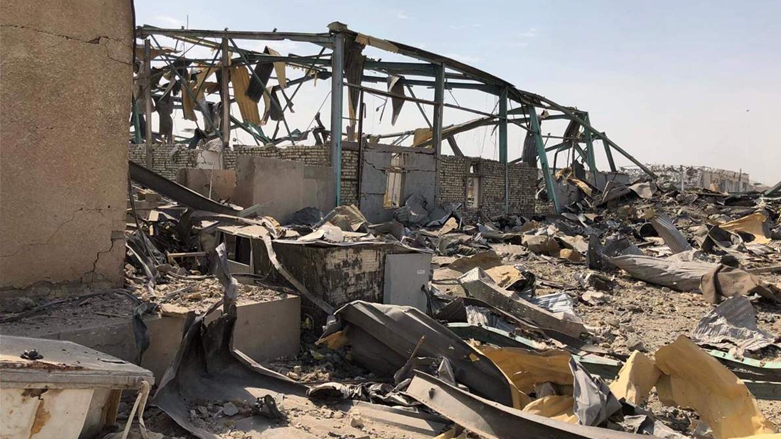Several casualties in clashes between Iranian forces and Kurdish opposition parties

ERBIL (Kurdistan 24) – A series of clashes between Kurdish opposition groups, civilians, and Iranian troops in different locations in western Iran resulted in at least two deaths and several injuries, according to multiple reports from a semi-official media agency and a local human rights watchdog.
The latest incident occurred on Saturday in a remote village near the border of the Kurdistan Region in Mariwan County of Iran's Kurdistan Province. The semi-official Tasnim agency reported that the unknown gunmen were “attempting to enter Iran Illegally.”
Islamic Revolutionary Guard Corps (IRGC) units stationed at the border, according to Tasnim, intercepted the Kurdish fighters, and, during the ensuing exchange, an IRGC member was killed and another was injured.
Tehran has assigned the IRGC the task of policing remote areas and borders of the country in Kurdish parts of Iran due to the presence of opposition groups fighting for expanded rights of the ethnic minority. No group has yet claimed responsibility for the most recent skirmishes.
The clash comes amid an apparent uptick in confrontations following an almost one-month-long period of quiet between IRGC units and most Kurdish groups. This was after Iranian forces bombarded the bases of Kurdish parties across its western border into the Kurdistan Region.
Related article: Two IRGC troops killed as Iran, Turkey sign deal on border security
At the same time, Iranian officials and Kurdish opposition parties were reportedly due to hold a secret meeting last month as tensions between Tehran and the West continues, with the Kurds holding little optimism for good results. It is still unclear if the talks have taken place and if they have, whether any results have yielded.
Nevertheless, multiple exchanges have taken place since late August, involving on at least one occasion, fighters from a Kurdish party that was able to be part of the talks with Iranian officials. Civilians from the region have also clashed with IRGC troops amid the country’s continued crackdown on alleged supporters of Kurdish movements.
Late Friday, an IRGC member was killed by unknown gunmen in the village of Zkriyani, located within Saravband, in Kurdistan province. The county is immediately south of Mariwan and has been the site of many armed exchanges in recent months.
In another incident to the north of Mariwan in the Kurdish-populated areas of West Azerbaijan (Shno) province, another armed group battled Iranian forces with no reports indicating the number of casualties. The latter then responded with concentrated shelling of the surrounded area in search of the fleeing fighters.
Hengaw, a local watchdog that documents these incidents as well as Kurdish rights abuses in Iran, reported last Sunday that Iranian forces that day skirmished with Kurdish workers in the city of Sardasht, West Azerbaijan.
The monitor wrote that Iranian security forces had chased a car carrying an unspecified number of purported workers, and after the latter vehicle came to a grinding halt due to an accident, the two sides exchanged fire. Two workers and six security officers were wounded.
While the Iranian officers were transported to the nearest hospital, the fate of the armed workers was not clear.
In an earlier standoff on Aug. 28, the IRGC killed two opposition fighters, which the Kurdistan Democratic Party – Iran (KDP-I) later confirmed were their members, in a clash in Piranshahr, West Azerbaijan. Another affiliate was injured and arrested. This occurred after unknown gunmen killed an IRGC officer in the same city.
About ten days following the late August confrontation, IRGC forces detained and gunned down two persons in the city of Mahabad for “supporting” the KDP-I, the party said in a statement. The exact circumstances of this incident could not be confirmed.
These developments come as Tehran continues to decrease its commitments to its nuclear deal with international powers, from which the US withdrew last year and re-imposed punitive sanctions on Iran as the latter continued to bolster its extraterritorial military presence and violate human rights of its citizens.
Since May, Iran has started to reduce its commitments to portions of the nuclear deal and has announced it will continue to do so. The country’s atomic energy agency confirmed recently that their stockpile of 4.5 percent enriched uranium had reached about 370 kilograms.
The limit Iran was originally allowed in the JCPOA was 300 kilograms of uranium not to exceed 3.67 percent purity. On Saturday, the country’s atomic energy agency said the country had the technological capability to go beyond 20 percent enrichment.
In tandem with this, the security situation in the Gulf waters south of Iran—which are a major international oil-exporting route—has become precarious since May this year as multiple tankers were attacked and IRGC naval forces seized multiple ships, including a British-flagged vessel.
Iranian authorities undertook the lattermost action after British special forces impounded early July an Iranian supertanker, Grace 1, off the coast of Gibraltar intending to deliver 2 million barrels of oil to Syria in contravention to European Union sanctions.
Related Article: Released Iranian tanker heads to Greece despite skepticism of its final destination
On Aug. 18, the vessel, renamed Adrian Darya 1, sailed back into international waters after local authorities stated Tehran had given guarantees the ship would not be heading to Syria despite Iranian authorities claiming otherwise.
In a photograph taken by an American satellite firm, Maxar Technologies Inc. on Sept. 6, Adrian Darya 1 was seen off the Syrian port of Tartus, Reuters reported. British authorities have not commented on the issue yet with their vessel still anchored in an Iranian port.
Editing by John J. Catherine

